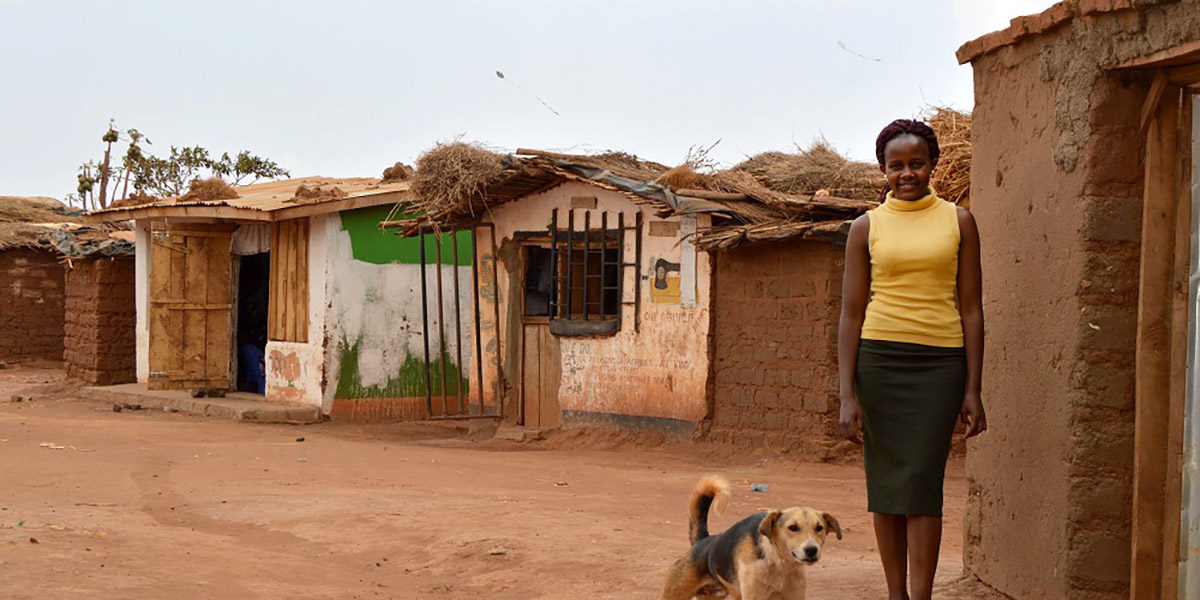Malawi: The Long Journey to Becoming a Medical Doctor
18 October 2016

Listening to Mirreille Twayigira’s story now, it is difficult to believe that she almost lost her life as a child as a result of malnutrition and exhaustion in the forests of Rwanda, the Democratic Republic of Congo, Zambia and Angola.
Mirreille reached Dzaleka Refugee Camp in Malawi in 2000, at the age of eight. She does not remember why or under what circumstances they had to flee the country of her birth, Rwanda, as she was only two years old when the genocide of 1994 occurred. All she recalls was that her father had been killed and she remembers snippets of his funeral.
Mirreille remembers their life on the run and the difficulties they continuously encountered in their pursuit of peace. She recalls how it seemed that wherever they moved, she and her family encountered violence, death and conflict. She recalls how she and her family survived by eating food from the forest, snuck onto farms and secretly took food to survive and how her clothes and the clothes of relatives had to be sold off their backs in exchange for food.
She arrived in Dzaleka with her grandfather and uncle; the others of her family members she escaped Rwanda with either died or disappeared along the way. She cannot remember when exactly she lost her mother. It is clear that Mirreille’s early childhood was filled with pain, suffering and strife.
“I started school in a refugee camp in Zambia, where I learned English, and so I started school in grade three at Dzaleka refugee camp. If we had not reached that camp in Zambia, I would have died. Today I know that with symptoms such as a distended abdomen, thinning hair and being tired all the time, I had been suffering from either kwashiorkor or marasmus,” Mirreille says.
Life continued to be difficult in Dzaleka, despite being a major improvement on the difficulties she experienced whilst on the road. Although food was available, it never seemed to be enough and her grandfather was not earning an income to provide for their additional needs for the family. However, she excelled at school.
“If given the resources, refugee children excel. It is probably because of what they went through, they see education as a way out,” Mirreille says. By the time she completed primary school, Mirreille was top of her class and received a scholarship when selected to attend the exclusive Likuni Girls’ Secondary School. Jesuit Refugee Service in Malawi had not yet built a secondary school in the camp, and Mirreille, like others at her school level, had to attend classes outside of the camp.
“Two years before I completed school, JRS had completed the construction of the secondary school and so all refugee children that had attended school outside the camp needed to return. However the principal and the senior staff at Likuni Girls’ Secondary refused to let me go and instead arranged further funding for me to complete my schooling there,” Mirreille explains with a modest smile.
Mirreille excelled beyond expectation and completed secondary school amongst the top six best performers in Malawi, at national level. The Zodiak Broadcasting Station visited Dzaleka to interview Mirreille on her exceptional achievement. This media exposure catapulted Mirreille into the public domain and she became very well known throughout Malawi. The Chinese government had promised that a scholarship would be provided to the top six highest academic achievers in Malawi.
This proved to be challenge as Mirreille was not a Malawian citizen, but a refugee with Rwanda being the country of her birth. Zodiak Broadcasting Station then embarked on an active advocacy drive to have Mirreille receive Malawian citizenship. About this interesting time in her life, she says through a shy giggle: “Imagine, they were debating my status in parliament. I was a little girl, still a child and they were busy debating me in parliament.”
She was soon thereafter granted Malawian citizenship, and in 2010 began her studies in medicine in Shandong Province, in Jinan City. Mirreille, despite a massive language gap, having to learn Mandarin and being in an unfamiliar cultural setting, completed her studies and graduated as a medical doctor in July 2016.
Now, she has returned to Malawi and still lives with her family in Dzaleka camp. Her grandfather tragically passed away and never got to see his granddaughter as a medical doctor, but Mirreille has registered with the Malawian Ministry of Health and is waiting to begin her internship.
“Wherever I am needed, I am willing to go. I want to work with people in the rural areas, I would love to work with refugees as I know what they go through. I want to give back to Malawi, because Malawi has given me so much.” she says about her future.
As for the role JRS played in her life, Mirreille says: “I would not be here if it were not for JRS. JRS educated me and provided the foundation on which I could build.” Jesuit Refugee Service sees Mirreille’s epic tale, much like that of many other refugees and asylum seekers, as testament to how people in motion give back to a society that welcomes them with hospitality. We have indeed been fortunate to have played a role in such an inspirational story.



